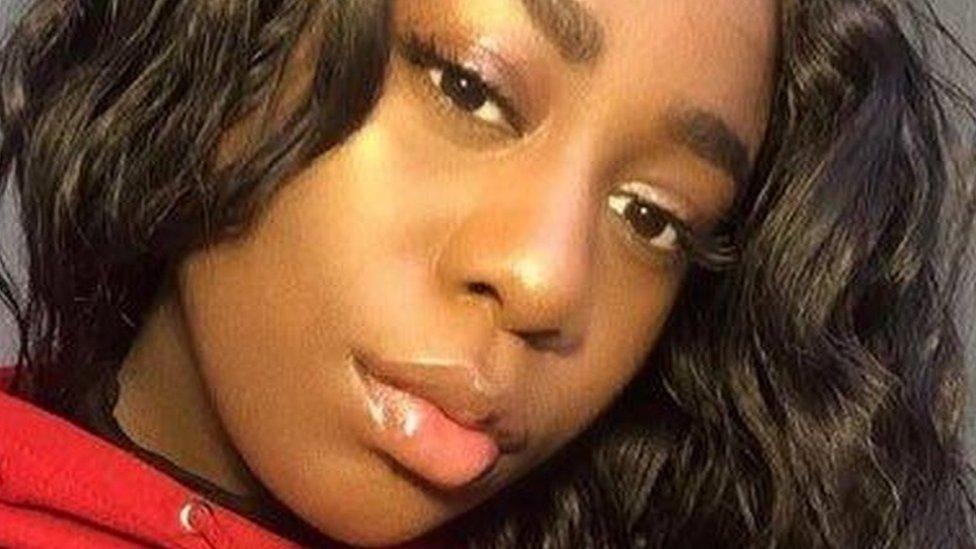Universities 'more concerned about reputation than racism'
- Published

Ms Martin said the government and universities needed to do more to confront racism
Universities are more concerned about their reputations than confronting the racist abuse of students, the National Union of Students president has said.
Shakira Martin told the BBC's Victoria Derbyshire programme she received calls from students reporting racist incidents on a daily basis.
Former Universities Minister David Lammy said incidents needed to be cracked down on "very aggressively".
Universities UK said there was no place for racism on a university campus.
The issue hit the headlines earlier this month when a student at Nottingham Trent University tweeted footage of alleged racist abuse outside her room at her halls of residence.
There are no overall figures for the number of racist incidents at universities, but a report by the NUS in 2011 found one in six black students had experienced racism at their institution.
'Feel unsafe'
But the NUS president said the real number could be a lot higher, as racism was one of the biggest issues black and other ethnic minority students were facing on campus.
"They're not prioritising it and taking it seriously... universities are more concerned about their reputation than the wellbeing of their students," Ms Martin said.
"I speak to students on a daily basis that tell me that they have been called the N-word or been discriminated against because of their colour or not let into a club because of their race."
She said both the government and universities needed to do more to resolve the problem.
"People feeling unsafe on campus, people feeling not welcome on campus, has a detrimental impact to how they feel to study and their outcomes," she said.
"This is something that we need to tackle, not because it's in the headlines of the media, but every student has the needs to be safe on campus."
Ms Martin said there should be a conversation about solutions led by the students who were experiencing racial abuse.
"It should be a standard procedure on our institutions that there is a zero tolerance to any forms of racism and discrimination," she said.
"And I think that the government needs to work with institutions and give them the money and the funding that is needed to support students that are going through this."
'Very aggressively'
Labour MP and former Universities Minister, David Lammy, also said institutions must act.
"Universities have to redouble their efforts to support students on campus and have to have a zero-tolerance approach to anything that comes anywhere near racial hatred," he said.
He said the increase in race hate on campus was a reflection of wider issues in society.
"I'm afraid there are young people arriving on university campuses listening to some of the xenophobia and racist conversations that they might have heard in the communities from which they're coming from, even sadly in their own family homes, and replicating this behaviour in the freedom of university," he said.
"So, we have seen a spike. It is a problem and it needs to be cracked down on very very aggressively."
The umbrella group Universities UK said universities had a vital role to play in promoting a "safe and inclusive environment in which students and staff of all backgrounds and ethnicities can flourish".
"The sector is clear that there is no place for racism on a university campus, nor anywhere else," said a spokesman.
"These issues are not isolated to universities. However, UK universities are in a position to lead the way in preventing and responding to hate crime.
"Ultimately, a long-term commitment by senior leaders will be vital to ensuring our universities are safe places to live, work and study."
Universities Minister Sam Gyimah said there was "absolutely no place" for any form of hatred, discrimination or racism in society.
"Universities have clear responsibilities under the Equality Act 2010 in this regard.
"I expect institutions to act swiftly to investigate and address hate crime, including racist related incidents reported to them."
'I felt unsafe'
Jordan, a maths student at the University of Surrey, was a victim of a racially aggravated assault last February.
"Fifteen students beat me up because of my skin, the colour of my skin," he says.

Jordan couldn't walk for two weeks after the attack
The group swore at him using racially abusive language as they walked past on campus. They then attacked him and he passed out, before they were chased off.
"The next thing I know I was in an ambulance being rushed to hospital because I had received quite severe blows - muscular injuries, some ligament injuries as well, to my head, my neck, my spine.
"I went home and I cried for a solid two hours," he says.
Jordan could not walk for two weeks after the beating, but his physical injuries have now healed. The emotional impact took a little longer.
"I felt unsafe, scared to be alone, especially at night time. So for a lot of months I struggled, sort of trying to leave alone, encouraging myself - you know, 'You can go to this lecture. You can walk that distance,'" he says.
"If I saw a rowdy group of white students, maybe at night time or otherwise, and I was alone, I'd instantly feel a sense of fear."
There was not enough evidence to press charges against those arrested, who were students at a different university. The University of Surrey said it remained appalled by the assault and racism was not tolerated in its community.
Watch the BBC's Victoria Derbyshire programme on weekdays between 09:00 and 11:00 on BBC Two and the BBC News channel.
- Published9 March 2018
